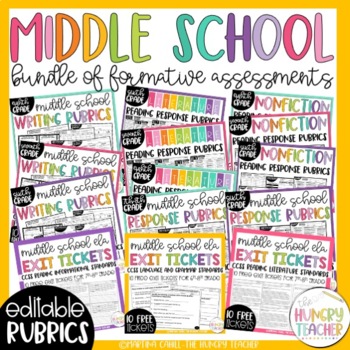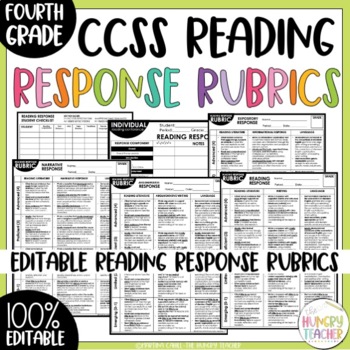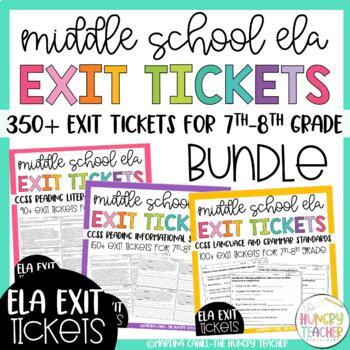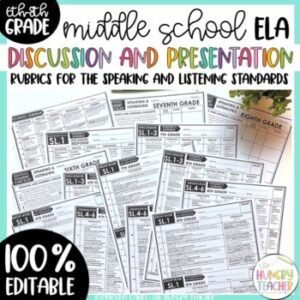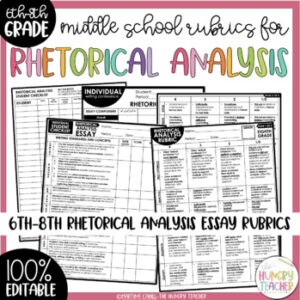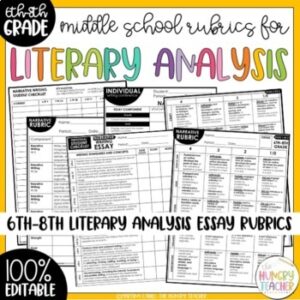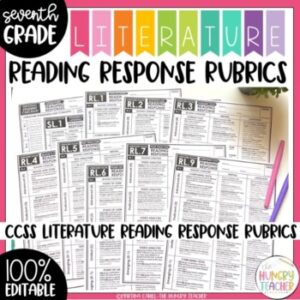Description
Download a preview <<HERE>>
This is a growing bundle, which means the sooner you buy, the more you will save.
-
Sixth Grade Editable Reading Response Rubrics: These rubrics have the sixth grade standard category, standard number correlation, the traits that align to the standard that shows students mastery, a points column, a place to write students’ strengths and goals, along with a sections to write notes and grades. These rubrics have a mixture of all reading, writing, and language standards to be used with reading responses and reading response notebooks that have a mixture of response.
-
Seventh and Eighth Grade Editable Reading Response Rubrics: These rubrics have the seventh and eighth grade standard category, standard number correlation, the traits that align to the standard that shows students mastery, a points column, a place to write students’ strengths and goals, along with a sections to write notes and grades. These rubrics have a mixture of all reading, writing, and language standards to be used with reading responses and reading response notebooks that have a mixture of response.
-
Sixth Grade Editable Literature Reading Response Rubrics: These editable literature rubrics were created to assess students’ reading responses based on specific sixth grade standards in each rubric to assess students’ abilities to analyze literary devices like: theme, mood and tone, cite textual evidence, plot, figurative language, text structure, characters, setting, point of view, comparing texts, argumentative writing, and narrative writing.
-
Seventh Grade Editable Literature Reading Response Rubrics: These editable literature rubrics were created to assess students’ reading responses based on specific seventh grade standards in each rubric to assess students’ abilities to analyze literary devices like: theme, mood and tone, cite textual evidence, plot, figurative language, text structure, characters, setting, point of view, comparing texts, argumentative writing, and narrative writing.
-
Eighth Grade Editable Literature Reading Response Rubrics: These editable literature rubrics were created to assess students’ reading responses based on specific eighth grade standards in each rubric to assess students’ abilities to analyze literary devices like: theme, mood and tone, cite textual evidence, plot, figurative language, text structure, characters, setting, point of view, comparing texts, argumentative writing, and narrative writing.
-
Citing Textual Evidence Reading Response Rubric
-
Theme Reading Response Rubric
-
Plot Reading Response Rubric
-
Mood and Tone Reading Response Rubric
-
Figurative Language Reading Response Rubric
-
Text Structures Reading Response Rubric
-
Point of View Reading Response Rubric
-
Comparing Texts Reading Response Rubric
-
Argumentative Writing Reading Response Rubric
-
Narrative Writing Reading Response Rubric
-
Reading Literature Reading Response Rubric
-
Reader’s Notebook Reading Response Rubric
-
Non-Fiction/Informational Reading Response Rubrics (Versions for each 6th, 7th, and 8th Grade Standards)
-
Grammar/Language Rubrics (Versions for each 6th, 7th, and 8th Grade Standards)
-
Writing Rubrics (Versions for each 6th, 7th, and 8th Grade Standards)
-
Providing text evidence
-
Inferences
-
Explicitly stated evidence
-
Theme
-
Main Idea
-
Character Traits
-
Literature summaries
-
How setting reveals character traits
-
How dialogue reveals character traits
-
Internal conflict
-
External Conflict
-
The four types of conflict
-
Characters: antagonist, protagonist, flat character, round characters, static character, dynamic character, sympathetic character, minor character
-
Literary Devices: flashback, flash-forward, cliff-hanger, suspense
-
Elements of plot: Exposition, inciting incident, rising action, climax, falling action, resolution
-
Word connotation and denotation
-
Context Clues
-
Figurative language: personification, allusion, alliteration, metaphor, simile, irony, idiom, hyperbole.
-
Poem analysis
-
Poetry terms: Rhyme, meter, rhythm, foot, verse, stanza, refrain, couplet, quatrain, octave, internal rhyme, end rhyme, partial rhyme, complete rhyme.
-
Assonance
-
Consonance
-
Mood
-
Tone
-
Point of View: First-person, second person, third person
-
Comparing movie adaptations to books
-
Comparing fictional and historical texts
-
Comparing how novels compare to: myths, Bible stories
-
Genres: fiction, non-fiction, biography, auto-biography, realistic fiction, dystopian, science fiction, fantasy, historical fiction.
-
Providing textual evidence
-
Thesis statements
-
Inferences
-
Explicitly stated evidence
-
Citing Textual evidence that strongly supports analysis
-
Citing Textual evidence that strongly supports inferences
-
Objective summaries
-
Central idea
-
Central idea development over the course of the text
-
Cause and Effect text relationships
-
Problem and Solution text relationships
-
Similarities and Differences text relationships
-
Sequence of events text relationships
-
Context clues to determine word meanings
-
Figurative language and impact on the text: personification, allusion, alliteration, metaphor, simile, irony, idiom, hyperbole.
-
Assonance
-
Consonance
-
Mood
-
Tone
-
How sections of the text contribute to the text as a whole
-
Analyzing how authors develop and organize the text
-
Author’s purpose: persuade, inform, entertain, explain, describe
-
Analyzing author’s distinguishing their point of view from others
-
Acknowledging and responding to conflicting evidence or viewpoints
-
Compare and contrast a text to an audio, video, or multimedia version of the text, analyzing each medium’s portrayal of the subject
-
Evaluate the advantages and disadvantages of using different mediums
-
Trace and evaluate the argument and specific claims in a text
-
Analyze how two or more authors writing about the same topic shape their presentations of key information
-
Genres: fiction, non-fiction, biography, auto-biography, realistic fiction, dystopian, science fiction, fantasy, historical fiction
-
Parts of Speech
-
Simple Sentences
-
Complex Sentences
-
Compound Sentences
-
Compound Complex Sentences
-
Independent and Dependent Clauses
-
Figurative Language: Hyperboles
-
Types of Phrases
-
Absolute Phrases
-
Appositive Phrases
-
Gerund Phrases
-
Infinite Phrases
-
Noun Phrases
-
Participle Phrases
-
Prepositional Phrase
-
Colons and Semicolons
-
Types of Pronouns
-
Possessive Pronouns
-
Reflexive Pronouns
-
Reciprocal Pronouns
-
Demonstrative Pronouns
-
Interrogative Pronouns
-
Indefinite Pronouns
-
Subordinating Conjunctions
-
Coordinating Conjunctions
-
Using Quotation Marks Correctly
-
Verb Moods
-
Indicative Verb Mood
-
Imperative Verb Mood
-
Interrogative Verb Mood
-
Conditional Verb Mood
-
Subjunctive Verb Mood
-
Figurative Language: Personification
-
Common Prefixes and their Meanings
-
Using Context Clues to determine word meanings
-
Connotation and Denotation
-
Infinitive Verbs
-
Present Participle Verbs
-
Past Participle Verbs
-
Past Tense Verbs
-
Common and Proper Nouns
-
Common Homophones
-
Intensive Pronouns
-
Vague Pronouns
-
Direct Objects
-
Indirect Objects
-
Object of the Preposition
-
Figurative Language: Metaphor
-
Figurative Language: Simile
-
Punctuation Nonrestrictive Elements
-
Author Style and Tone
-
Comparative Adjective
-
Superlative Adjectives
-
Benefits of using the four different type of sentence structure (variety)
-
Proper noun Rules
-
Dangling Modifier Rules
-
Expressing Ideas Precisely and eliminating wordiness and redundancy
-
Plural Noun Rules
-
Verbals
-
Gerunds
-
Infinitives
-
Past and Present Participle
-
Abstract Nouns
-
Concrete Nouns
-
Punctuating and Capitalizing Titles of Works
-
Subjects and Predicates
-
Simple Subjects and Predicates
-
Compound Subjects and Predicates
-
Verb Tenses (12 Different Verb Tenses)
-
Action Verbs
-
Linking Verbs
-
Helping Verbs
-
Figurative Language: Allusion
-
Rules for Using Numbers in English
-
Rules for Using Apostrophes in English
-
Rules for Using Commas in English
-
Prepositions and Prepositional Phrases
-
Direct Objects
-
Indirect Objects
-
Object of the Preposition
-
Commonly Confused Words
-
Situational Irony
-
Dramatic Irony
-
Verbal Irony
-
Active Verbs
-
Passive Verbs
-
Imperative Sentences
-
Exclamatory Sentences
-
Interrogative Sentences
-
Declarative Sentences
-
Descriptive Adjective
-
Quantitative Adjectives
-
Demonstrative Adjectives
-
Possessive Adjectives
-
Distributive Adjectives
-
Interrogative Adjectives
-
Articles (Adjectives)
-
Antonyms
-
Synonyms
-
Figurative Language: Idioms
-
Differences between Who and Whom
